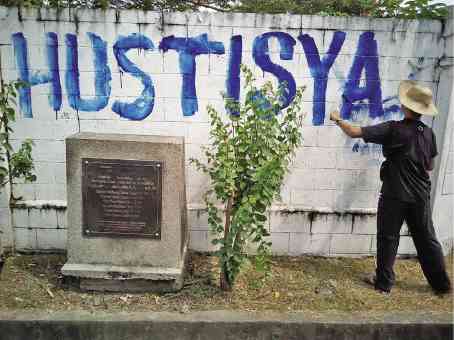No justice yet in Luisita massacre

Calls for justice echo in Hacienda Luisita in Tarlac province as farmers remember the people killed in the dispersal of striking workers in the sugar estate 12 years ago. PHOTO FROM MANILA TODAY
CITY OF SAN FERNANDO—It has been 12 years but no one has been brought to justice for the deaths of seven people in a clash between striking workers of Hacienda Luisita and policemen and soldiers ordered to retake the gate of the sugar mill in 2004.
The sprawling sugar estate in Tarlac province was owned by the family and relatives of former President Benigno Aquino III.
“What more would the Ombudsman need [in prosecuting officials] when seven [died] and several others were wounded [in that clash],” said Jobert Pahilga, a lawyer providing free legal services to Sentro para sa Tunay na Repormang Agraryo (Sentra).
In 2005, former Ombudsman Merceditas Gutierrez dismissed the charges filed against Aquino, then a Tarlac representative, citing insufficiency of evidence.
The charges involved multiple murder, multiple frustrated murder, multiple attempted murder, murder, physical injuries, theft and malicious mischief that arose from the shooting and killing of Jaime Pastidio, Jhaivie Basilio, Adriano Caballero, Jessie Valdez, Jesus Laza, June David and Juancho Sanchez on Nov. 16, 2004.
On Dec. 10, 2010, an Ombudsman division absolved military and police officials of similar charges.
“[The Ombudsman] said the gunmen were not identified. There was no basis to believe that the seven workers shot themselves or that they were shot dead by their fellow striking workers,” Pahilga told the Inquirer by telephone on Wednesday.
In October 2014, Ombudsman Conchita Carpio Morales turned down Sentra’s motion to reopen criminal and administrative cases against Aquino, former Armed Forces chief of staff, Gen. Gregorio Pio Catapang, former Labor Secretary Patricia Sto. Tomas, former Labor Undersecretary Manuel Imson and sheriff Francis Reyes.
Aquino’s uncles and Hacienda Luisita owners Pedro and Jose Cojuangco, Ricardo and Jose Manuel Lopa, and Central Azucarera de Tarlac (CAT) executive Ernesto Topacio were also subjects of the complaint. Pedro Cojuangco died in 2014.
It was only in November 2014 when a report from the National Bureau of Investigation about the clash was made public.
Higher wages
Pahilga said Sentra has formed a group of lawyers to gather evidence and prepare a new complaint in connection with the Luisita massacre. The courts give at least 20 years as the period for the filing of criminal cases from the time the alleged crimes were committed.
The clash took place when the strike entered its third month and Sto. Tomas assumed jurisdiction over it.
CAT employees demanded higher wages and additional benefits while farmworkers demanded the cancellation of the stock distribution program and sought the distribution of lands in the 6,000-hectare sugar estate bought by Aquino’s grandfather in 1957.
After the strike, several union leaders of CAT, like Ricardo Ramos, fell victims to extrajudicial killings. In 2015, the mill was sold, with the Cojuangco and Aquino families owning minority shares.
The Supreme Court in April 2012 upheld the 2005 decision of the Presidential Agrarian Reform Council to distribute 4,500 hectares of Luisita land to over 6,000 farmworkers.
The court also ordered Hacienda Luisita Inc. (HLI) to pay the workers P1.3 billion.
Agrarian Reform Secretary Rafael Mariano vowed to stop what he described as a “bogus” agrarian reform program covering Hacienda Luisita by removing the control of Aquino’s allies over the lands.
In congressional hearings, Aquino, CAT and HLI officials denied ordering the use of force to break the picket line and resume ingress to the sugar mill.
Clash reenactment
On Wednesday, a theater group reenacted the clash there and led the tribute to the seven workers who had been hailed as “martyrs in the bloody and difficult agrarian struggle at the estate.”
“Twelve years have passed and the families of the victims continue to mourn and are still very much indignant as justice remains elusive,” Danilo Ramos, Unyon ng mga Manggagawa sa Agrikultura secretary general, said in a statement.
Ramos said Aquino “got away with not having to face prosecution and even went on to become the highest official of the land.”